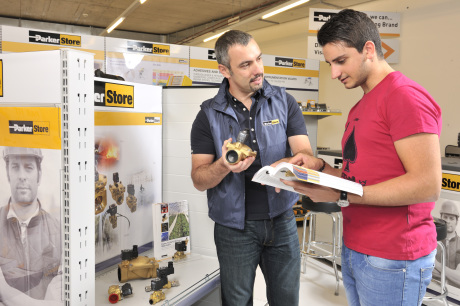For MRO specialists – companies contracted to provide maintenance and repair parts and services – the past two decades have seen a dynamic shift in business strategy. The end customers being served by these operations cannot afford downtime, as this comes with a heavy price tag in terms of cost, but also with regard to lost productivity and reputation. When plant and equipment needs repair, MRO organisations have to act quicker than ever as production and projects are costed and monitored more tightly today than at any time before.
Products, knowledge, service and reaction time when a product or system goes down on site is key to setting an MRO specialist apart from its competitors and pleasing the end customer. Whether it’s the face-to-face service provided by knowledgeable staff, in-store hose make-up and repair capabilities, or on-site hose fabrication such as with Parker’s Hose Doctor and ParkerStore units, the service an end user gets is crucial.
MRO specialists such as ParkerStore provide an environment for the immediate and direct sale of industrial products through an approved platform that serves the walk-in MRO customer. Combining the trade counter and retail models, such outlets allow customers to order bespoke, while-you-wait hydraulic hose assemblies while shopping for complementary products such as couplings, fittings, valves, filters, lubricants, oil, tooling, safety equipment and more.
But as important is the knowledge, expertise, information and support that goes hand-in-hand with high product availability. The customer won’t always know exactly what they need, or what is best to solve a specific problem, and so an MRO specialist such as ParkerStore who can also take on the role of trusted advisor is of huge value. Furthermore, the ability, if required, to deliver that expertise at the end customer location is also important.
Despite the growth of the Internet, a catalogue remains a vital tool that allows plant and maintenance engineers to find what they need. Typically, catalogues are classified into quick reference categories so that engineers can go directly to sections on hydraulics, pneumatics, compressed air/gas treatment, industrial hoses, fuel filters, instrumentation/process, maintenance consumables and tooling/accessories, for example. As well as printed catalogues available in store and to take away, an online version should also be available.
A huge element of the MRO market that has changed over the course of the past two decades is the use of the internet and technology in general for example access to parts and ordering via mobile platforms such as smartphones and tablets. The internet links businesses to consumers and businesses to businesses with a speed and ease-of-use that facilitates the flow of information from the retailer to the customer and vice versa.
The web has allowed industrial retail outlets to optimise the supply chain using the latest communications technologies and advanced supply chain strategies to ensure high availability of the right parts at the right locations. Demand trends can be monitored in line with local requirements. This provides a huge boost to end customers seeking to highlight and work with the best MRO specialists.
Forward-thinking MRO retail outlets also use social media channels such as LinkedIn, Facebook and Twitter, to engage with the next generation of industrial consumers. This can help engineers stay abreast of the latest product developments as well as knowledge-sharing, tips and ideas.
Choosing a reputable, reliable MRO specialist makes the difference in MRO success for the end user. The watchword is to select wisely because many maintenance labour delays are related to issues concerning materials and spare parts. Supply problems can include no locally available stock, late deliveries, incorrect deliveries, and parts that are damaged and cannot be used when they do arrive.
ParkerStore is an example of an organisation that has drawn on its many years of experience at the front-end of the MRO process and recognises the huge importance of helping such mistakes being avoided. Consequently, supplementary initiatives such as the clear identification of components on the part itself and extensive manufacturer cross-reference apps for products such as filters have been developed to minimise risk.
Getting it right has helped a number of MRO distributors survive the economic downturn in recent years, and some have even managed to grow their market share. For many, this has meant taking a new strategic approach to understanding emerging customer demand and the key market drivers.
For more information, visit the company’s web site at www.parker.com, or its investor information web site at www.phstock.com



